中职英语基础模块unit3Campus-life
中职英语基础模块上册第三单元课文知识讲解

glass(玻璃) a glass(一个玻璃杯),tea(茶) two teas(两
•
一般可数,有单复数形式。
•
(3)物质名词。如:rice,water,cotton等。
•
一般不可数,没有单复数之分。
•
(4)抽象名词。如:love,work,life等。
•
一般不可数,没有单复数之分。
•
2. 专有名词:如:China,Newton,London等。
• 名词可数名词和不可数名词 • 不可数名词一般没有复数形式, • 如:water---some water , milk---a glass of milk • 可数名词有单数和复数两种形式。
•
• (一)可数名词的复数形式的构成规则
• 在英语中,可数名词如果表示的数量为“一 个”,则用其单数形式,若表示的数量为 “一个以上”,则
• 1. 一般情况下在名词的词尾加s,如:
• book--- books,pencil ---pencils.
• 2. 以-s,-x,-ch,-sh结尾的名词加-es,
当数词大于1时,量词须变为复数。如:a piece of advice(一条
建议) five pieces of advice(五条建议),a bag of rice(一袋大
米) three bags of rice(三袋大米)。
•
可数名词的量也可以用适当的量词来表达。
•
2. 不可数名词的转化
•
(1)物质名词表示种类或具体事物时则成为可数名词。如:
•
(二)不规则名词的复数形式
•
1. 改变单数名词中的元音字母或其他形式。如:
man men,woman women,tooth teeth,foot feet,
中职英语基础模块unit3Campus-life

想念你 电话号码
我的邮箱地址
Miss you Telephone number My e-mail address
发送邮件或短信
Send e-mail or text messages
致以良好的祝愿 With best wishes
Unit3 Campus life
Knowledge is power. ---Francis Bacon
[ˈnɔlidʒ]
[ˈpauə]
知识就是力量。--弗朗西斯·培根
汉译英,并根据英文分段复数课文。
Paragraph 1、
在…的问候 Greetings from… 感谢你… Thank you… 我很高兴…我 I’m glad to…that I’m 现在是… now…
understand Chinese
对…友好善良 对…关心
在…的帮助下
Be kind and Show concern about With the help of friendly
进展顺利 Go well
汉译英,并根据英文复数课文Paragraph 3:
在上午
在下午
In the morning In the afternoon 从周一至周五 From Monday to Friday
我正在这里…I am here...
汉译英,并根据英文复数课文 Paragraph 2:
一个月以前 来到 到达 A month ago Come to get to
对…是陌生的
Be strange to
说和理解汉语 起初 在课堂上 感到紧张
Speak and
At first In class Feel nervous
语文版中职英语(基础模块 上册)Unit 3《Campus Life》ppt课件1

classes
knives children
potatoes oranges photos 2. 1) students 4) buses Writing
students leaves 3) men 6) boys
2) ball, boxes 5) children
Lily, concern about me, ShiJIaZhuang Medical College, to introduce my school to you, is going well, friendly, study, learn English, activities, the basic courses, E-mails or call me
5. I’m glad to say that with the help of the teachers and my classmates, everything is going well. with the help of “在…的帮助下” eg: With the help of my friends, I can pass the exam. go well 进展的顺利 eg: How is everything going well?
eg: On weekends, I usually play with my daughter.
8. go sightseeing 去观光,旅游
9. I’m having a good time here.
have a good time (= enjoy oneself) 玩得高兴 玩得愉快
eg: I hope you will have a good time during the holiday.
中职英语基础模块上册第三单元课文ppt课件
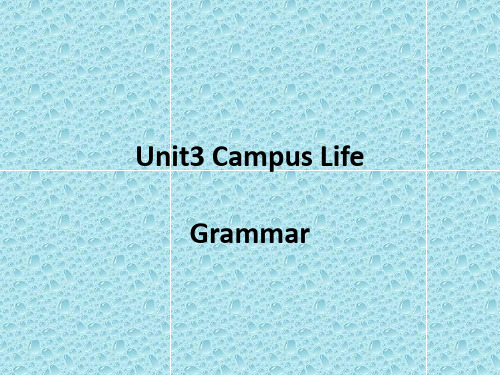
child children等。
•
2. 单复数形式相同。如:sheep,deer,fish等,以及由
汉语音译表示度量、币制等单位的名词。如:yuan.另外以-
ese或-ss结尾的表示民族的名词也一样同形。如:Chinese,
Japanese,Swiss等。
•
以-an结尾或其他形式结尾的表示民族、国家的人的名词
变复数时在词尾加-s.如:Americans,Asians,Russians, Australians,Italians,Germans等。
•
注意:Englishman Englishmen,Frenchman Frenchmen.
.
• 3. 复合名词的复数形式:
•
(1)在词末加-(e)s,如:afternoons,
•
一般不可数,没有单复数之分。
•
2. 专有名词:如:China,Newton,London等。
.
• 名词可数名词和不可数名词 • 不可数名词一般没有复数形式, • 如:water---some water , milk---a glass of milk • 可数名词有单数和复数两种形式。 •
.
• (一)可数名词的复数形式的构成规则
•
2. 不可数名词的转化
•
(1)物质名词表示种类或具体事物时则成为可数名词。如:
glass(玻璃) a glass(一个玻璃杯),tea(茶) two teas(两
杯茶),ice(冰) three ices(三个冰淇淋)。
•
(2)抽象名词具体化时也可成为可数名词。如:beauty
(美丽) a beauty(一个美人),youth(青春) a youth(一
最新中职英语基础模块授课教案:Unit3CampusLife

中职英语基础模块授课教案Unit3 Campus LifeTeaching goals:1.Knowledge:To master these new words and useful expressions, and can use them to make sentences.To understand parts of speech, know about n(c) and n (u), singular form and plural form.2.Skills:To listen to and talk about something.To read article about campus life.To imitate the text and describe campus life about themselves.3.GrammarTo master the regular of Plural Form of n(c)To write the Plural Form of n(c) smoothly.To use the possessive case of nouns.Teaching Important Points:1. Students can read articles about campus life and master key words and expressions.2. The usage of nouns.Teaching Difficult Points:1.How to train the students’ reading ability.2.How to train the students’ ability to use nouns.Teaching ways:Combine speaking with reciting, teach by a large number of oral practice.Teaching steps:Reading:ⅠWarm upAsk students to read pictures on page 18, then make sentences according to these pictures.e.g. This is our school classroom building. There are many classrooms in the building.Ask more students to practice.ⅡFast reading1.Read new words and explain hot words in proper.2.Ask students to read the passage, and do practice on page 20.3.Ask students to read the sentences of the practice and then try totranslate it.4.Summarize the main idea of the passage.ⅢLanguage points1.agoe.g. three days ago; a year ago★Simple Past Tense:Come—came get—got feel—felt2.whene.g. When I got to the station, I found no one here.3. get to4. followe.g. Sorry, I can’t follow you.If you follow your parents advice, you’ll do it better.5.show concern about6.with the help of7.get along&go wellⅣHomeworkRead passage again and do practice on Page 21.Correct them next class.Grammar:ⅠIntroduce new grammar: the part of speech, nouns.(page119—120) Important points:The Plural Form of Nouns1.Take many words for example.2.Sum up the regular of Plural form of countable nouns.3.Then do practices on page 22.Ⅱ The possessive case of nouns1.Give many examples of the possessive case of nouns.2.Do some exercises about the possessive case of nouns.Ⅲ HomeworkAsk students to do exercises in exercise book.Listening and Speaking1.Ask students to look at the pictures on the page 22 and 23, and talkabout them.2.Listen to the tape, and fill the blanks. Then correct them.3.Sum up the sentence pattern about talking about something.4.Write down them on the blackboard.★What’s this/that(in English)? It’s a .../This is a…★What are these/those? These/Those are…★Is this/that a…? Yes, it is. / No, it isn’t.★Are these/those…? Yes, they are. / No, it isn’t.5. Students practice in groups.6. Ask some students to role play.Writing1.Ask students to read the text of Unit 3 again.2.Ask students to read the expressions on the envelope.3.Ask one or two students to speak out the differences between theChinese envelope and English envelope.4.Ask students to complete the letter. Then discuss how to write it better. Homework●Remember the words and useful expressions.●Recite the text.●Do practices about nouns.。
中职英语基础模块上册第三单元课文ppt课件

.
• 4. 以-f和-fe结尾的名词: • (1)变-f或-fe为v再加-es,读音为
[vz]。如:thief--- thieves,wife ---wives, half--- halves等。 • (2)直接在词尾加-s,如:roof--roofs,gulf ---gulfs,chief ---chiefs,proof --proofs等。 • 5. 以-o结尾的名词:
easy • 数词(num.):表示数量和顺序。Two, tenth
.
• 动词(v.):表示动作或状态。Jump, eat • 副词(adv.):修饰动词、形容词或其他副词,very,
early • 介词(prep.):表示名词或代词与句中其他词的关
系。On, with • 连词(conj.):连接词与词、短语与短语或句与句
个青年)。
•
(3)表示具体事物的可数名词,用于表示抽象或物质意义
是,便转化为不可数名词。如:a room(一个房间) room(空
间),a chicken(一只小鸡) chicken(鸡肉)。
.
.
.
.
.
.
此课件下载可自行编辑修改,此课件供参考! 部分内容来源于网络,如有侵权请与我联系删除!感谢你的观看!
.
• (三)几种特殊的复数形式的名词
•
1. 有些表示由两部分构成的东西和部分学科的名
词总以复数的形式出现。如:glasses(眼镜),
shorts(短裤),mathematics(数学),physics(物
理学),politics(政治学)等。
•
基础模块上册 Unit3 Campus life
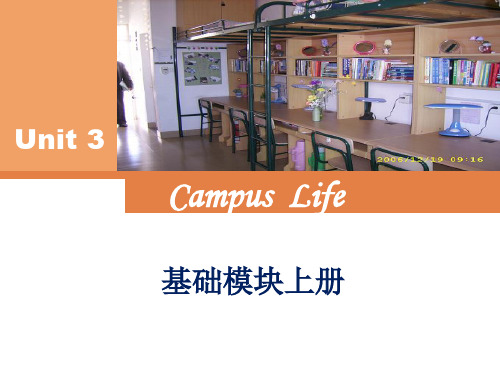
Reading
Unit 3
Activity 6 对比汉语和英语信函的格式
李宁: 你好!
September20,2009 Dear Jennifer:
4) at first
eg: He couldn’t speak English at first. 起初他不会说英语。
Language Points
Unit 3
P2r.oRceeaddiunrge
第3段 5) follow 跟随;本句中译为“听得懂,跟得上”
eg: The teacher asked: “Could you follow me?” 老师问: “你们能听懂吗?”
me.
Reading
write an e-mail to … write a letter to….
Unit 3
Unit 3
Reading
Unit 3
Activity 2 Have you called / written a letter / sent an E-mail to invite your friends to visit your new school ?
Reading
Unit 3
PeThe answers to the questions.
1. His friend, Jennifer 2. A month ago. 3. He couldn’t follow the teachers in class, because he
cannot speak and understand Chinese. 4. There are 7 classes in a day. Four in the morning ,
中职英语基础模块上册第三单元课文
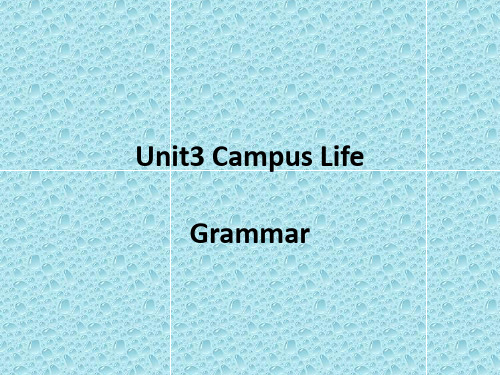
• 一、名词的分类
• • • • • • • • • • • 名词可分为普通名词和专有名词两大类。 1. 普通名词又可分为: (1)个体名词。如:cup,desk,student等。 一般可数,有单复数形式。 (2)集体名词。如:class,team,family等。 一般可数,有单复数形式。 (3)物质名词。如:rice,water,cotton等。 一般不可数,没有单复数之分。 (4)抽象名词。如:love,work,life等。 一般不可数,没有单复数之分。 2. 专有名词:如:China,Newton,London等。
• 动词(v.):表示动作或状态。Jump, eat • 副词(adv.):修饰动词、形容词或其他副词,very, early • 介词(prep.):表示名词或代词与句中其他词的关 系。On, with • 连词(conj.):连接词与词、短语与短语或句与句 and, but • 感叹词(interj.):表示说话时的喜悦、惊讶等情感, oh, well
• 4. 以-f和-fe结尾的名词: • (1)变-f或-fe为v再加-es,读音为 [vz]。如:thief--- thieves,wife ---wives, half--- halves等。 • (2)直接在词尾加-s,如:roof--roofs,gulf ---gulfs,chief ---chiefs,proof --proofs等。 • 5. 以-o结尾的名词:
• (1)以“辅音字母+o”结尾的名词后直接加-es,读音为 [z]。如:hero heroes,potato potatoes,tomato tomatoes等。 • (二)不规则名词的复数形式 • 1. 改变单数名词中的元音字母或其他形式。如: man men,woman women,tooth teeth,foot feet, mouse mice,child children等。 • 2. 单复数形式相同。如:sheep,deer,fish等,以 及由汉语音译表示度量、币制等单位的名词。如:yuan. 另外以-ese或-ss结尾的表示民族的名词也一样同形。如: Chinese,Japanese,Swiss等。 • 以-an结尾或其他形式结尾的表示民族、国家的人 的名词变复数时在词尾加-s.如:Americans,Asians, Russians,Australians,Italians,Germans等。 • 注意:Englishman Englishmen,Frenchman Frenchmen.
《英语 基础模块》上册 Unit 3 Campus Life

Language & Culture Press
Unit 3
Speaking
Activity 1 Say something about your school . 说说你的学校,请练习使用下列句型.
What is this / that? This / That / It is _our library . These / Those / They are my classmates. These are some / many / a lot of _trees_ in _our campus_. These are not any _computers in my classroom.
Speaking
What’s this in English? It’s a computer.
Language & Culture Press
Unit 3
Speaking Activity 4 Draw a picture of your own rooms and write down the English names of the things in your rooms. Then talk about your rooms like this: What’s this in English? It’s a / an ... Is this a …?
Unit 3
Speaking
What’s this in English? It’s a jacket.
Language & Culture Press
Unit 3
Speaking
What are these in English? It’s oranges.
语文版中职英语(基础模块 上册)Unit 3《Campus Life》ppt课件3

Campus life 校园生活
dormitory
dormitory
canteen/dining hall
playground
library
New Words and Expressions
Greetings n.祝贺,问候 Greetings from Beijing,China. 在中国北京向你问好。 Thank you for为某事而感谢 • Thank you for looking after us so well. • 感谢你们对我们照顾得如此周到。
• show [ʃəʊ] • vt. 显示;说明;演出;展出
n. 显示;表演;炫耀 • [ 过去式showed 过去分词showed 或 shown 现在分词showing • show concern about • 对……的关心
help 英[help] • vt. 帮助;补救 • n. 帮助;补救办法;帮忙者;有益的东西 • with the help of • classmate ['klæsmet] • roommate['ruːmmeɪt] ['rummet] • n. 室友
If you hear the following words, where does the dialogue probably take place?
*Headmaster, students, headteacher, professor, homework, exam, test
At school /On campus
speaking ] • understand [ʌndə'stænd] • vt. 理解;懂; • at first起初
• follow ['fɒləʊ] • v. 跟随 • in class 课上 • after class课下 • feel [fiːl] • vt. 感觉;触摸 • [ 过去式felt 过去分词felt 现在分词feeling ]
语文版中职英语基础模快上复习教案Unit 3 Campus Life Revision
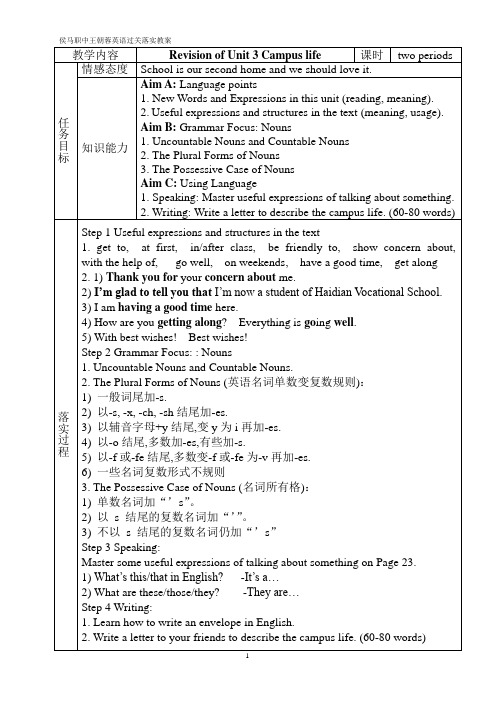
Revision ofUnit 3 Campus life
课时
twoperiods
ቤተ መጻሕፍቲ ባይዱ任务目标
情感态度
School is our second home and we should love it.
知识能力
Aim A:Language points
1.New Words andExpressionsin this unit (reading, meaning).
5) With best wishes! Best wishes!
Step 2Grammar Focus::Nouns
1. Uncountable Nouns and Countable Nouns.
2. The Plural Forms of Nouns (英语名词单数变复数规则):
1)一般词尾加-s.
2.1)Thank you foryourconcern aboutme.
2)I’m glad to tell you thatI’m now a student of Haidian Vocational School.
3) I amhaving a good timehere.
4) How are yougetting along? Everything isgoingwell.
小结作业
1.Write a letter to your friends to describe the campus life. (60-80 words))
2. Finishthe test inUnit3on Page 42-46 inGuide and Practice.
板书设计
教学评价
中职英语基础模块上册 Unit3 Campus Life

虚词 (意义不完整,不能独立 作句子成分的词)
“名代动→数形副→介冠连感”
friend with
kind adj.和蔼的,亲切的
kindness n.和蔼,友善
be kind to 对……和蔼可亲的
It’s kind of sb. to do sth. ……对某人来说太仁慈了
Eg. (1) The teacher is kind to all of us.
(2) It’s kind ___ me.
The young man always shows off his brand coats.
那个年轻人总是炫耀他的名牌外套
(1) with the help of 在……的帮助下
Eg: With the help of my sister, I finished
my novel.
在我姐姐的帮助下我完成了我的小说
bus
buses
map maps
class classes
potato potatoes
student students
desk desks
woman women
family families
teacher teachers
orange oranges
leaf
leaves
watch watche . city scities . day days . knife knives .
中职英语基础模块上册第三单元课文
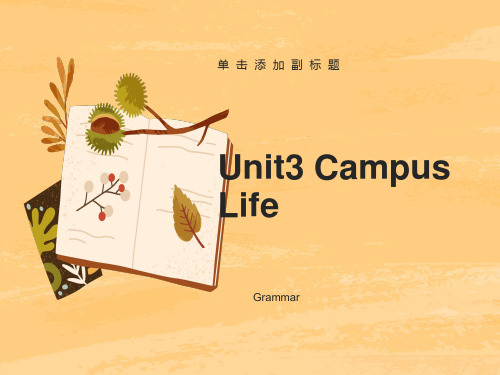
有些名词在习惯用语中一定要用复数形式。如:make friends with(与……交朋友),shake hands with(与……握手)等。
(四)不可数名词 1. 物质名词和抽象名词多为不可数名词。如:luggage,milk,rice,soup,water,money,meat等。 注意:不可数名词在表示量的时候需要用上适当的量词,当数词大于1时,量词须变为复数。如:a piece of advice(一条建议) five pieces of advice(五条建议),a bag of rice(一袋大米) three bags of rice(三袋大米)。 可数名词的量也可以用适当的量词来表达。 2. 不可数名词的转化 (1)物质名词表示种类或具体事物时则成为可数名词。如:glass(玻璃) a glass(一个玻璃杯),tea(茶) two teas(两杯茶),ice(冰) three ices(三个冰淇淋)。 (2)抽象名词具体化时也可成为可数名词。如:beauty(美丽) a beauty(一个美人),youth(青春) a youth(一个青年)。 (3)表示具体事物的可数名词,用于表示抽象或物质意义是,便转化为不可数名词。如:a room(一个房间) room(空间),a chicken(一只小鸡) chicken(鸡肉)。
单击此处添加大标题内容
单击此处添加正文,文字是您思想的提炼,为了演示发布的良好效果,请言简意赅地阐述您的观点。您的内容已经简明扼要,字字珠玑,但信息却千丝万缕、错综复杂,需要用更多的文字来表述;但请您尽可能提炼思想的精髓,否则容易造成观者的阅读压力,适得其反。正如我们都希望改变世界,希望给别人带去光明,但更多时候我们只需要播下一颗种子,自然有微风吹拂,雨露滋养。恰如其分地表达观点,往往事半功倍。当您的内容到达这个限度时,或许已经不纯粹作用于演示,极大可能运用于阅读领域;无论是传播观点、知识分享还是汇报工作,内容的详尽固然重要,但请一定注意信息框架的清晰,这样才能使内容层次分明,页面简洁易读。如果您的内容确实非常重要又难以精简,也请使用分段处理,对内容进行简单的梳理和提炼,这样会使逻辑框架相对清晰。为了能让您有更直观的字数感受,并进一步方便使用,我们设置了文本的最大限度,当您输入的文字到这里时,已濒临页面容纳内容的上限,若还有更多内容,请酌情缩小字号,但我们不建议您的文本字号小于14磅,请您务必注意。单击此处添加正文,文字是您思想的提炼,为了演示发布的良好效果,请言简意赅地阐述您的观点。您的内容已经简明扼要,字字珠玑,但信息却千丝万缕、错综复杂,需要用更多的文字来表述;但请您尽可能提炼思想的精髓,否则容易造成观者的阅读压力,适得其反。正如我们都希望改变世界,希望给别人带去光明,但更多时候我们只需要播下一颗种子,自然有微风吹拂,雨露滋养。恰如其分地表达观点,往往事半功倍。当您的内容到达这个限度时,或许已经不纯粹作用于演示,极大可能运用于阅读领域;无论是传播观点、知识分享还是汇报工作,内容的详尽固然重要,但请一定注意信息框架的清晰,这样才能使内容层次分明,页面简洁易读。如果您的内容确实非常重要又难以精简,也请使用分段处理,对内容进行简单的梳理和提炼,这样会使逻辑框架相对清晰。为了能让您有更直观的字数感受,并进一步方便使用,我们设置了文本的最大限度,当您输入的文字到这里时,已濒临页面容纳内容的上限,若还有更多内容,请酌情缩小字号,但我们不建议您的文本字号小于14磅,请您务必注意。单击此处添加正文,
中职英语基础模块上册第三单元课文ppt课件

变复数时在词尾加-s.如:Americans,Asians,Russians, Australians,Italians,Germans等。
•
注意:Englishman Englishmen,Frenchman Frenchmen.
.
• 3. 复合名词的复数形式:
•
(1)在词末加-(e)s,如:afternoons,
.
• (一)可数名词的复数形式的构成规则
• 在英语中,可数名词如果表示的数量为“一 个”,则用其单数形式,若表示的数量为 “一个以上”,则
• 1. 一般情况下在名词的词尾加s,如:
• book--- books,pencil ---pencils.
• 2. 以-s,-x,-ch,-sh结尾的名词加-es,
•
一般可数,有单复数形式。
•
(3)物质名词。如:rice,water,cotton等。
•
一般不可数,没有单复数之分。
•
(4)抽象名词。如:love,work,life等。
•
一般不可数,没有单复数之分。
•
2. 专有名词:如:China,Newton,London等。
.
• 名词可数名词和不可数名词 • 不可数名词一般没有复数形式, • 如:water---some water , milk---a glass of milk • 可数名词有单数和复数两种形式。 •
and, but • 感叹词(interj.):表示说话时的喜悦、惊讶等情感,
oh, well
.
• 一、名词的分类
•
名词可分为普通名词和专有名词两大类。
•
1. 普通名词又可分为:
•
(1)个体名词。如:cup,desk,student等。
职高第一册第三单元Campus-life学案
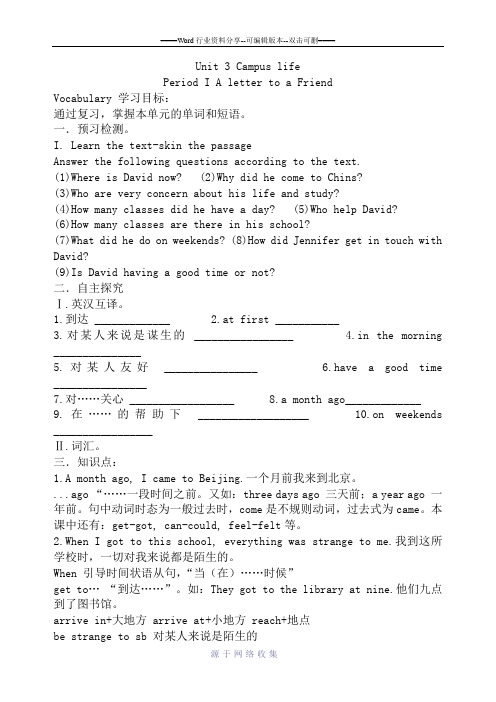
Unit 3 Campus lifePeriod I A letter to a FriendVocabulary 学习目标:通过复习,掌握本单元的单词和短语。
一.预习检测。
I. Learn the text-skin the passageAnswer the following questions according to the text.(1)Where is David now? (2)Why did he come to Chins?(3)Who are very concern about his life and study?(4)How many classes did he have a day? (5)Who help David?(6)How many classes are there in his school?(7)What did he do on weekends? (8)How did Jennifer get in touch with David?(9)Is David having a good time or not?二.自主探究Ⅰ.英汉互译。
1.到达 _____________2.at first ___________3.对某人来说是谋生的_________________4.in the morning _______________5.对某人友好________________6.have a good time ________________7.对……关心 __________________ 8.a month ago_____________ 9.在……的帮助下___________________ 10.on weekends _________________Ⅱ.词汇。
三.知识点:1.A month ago, I came to Beijing.一个月前我来到北京。
中职英语语文版基础模块上册Unit 3 Campus life 随堂测试
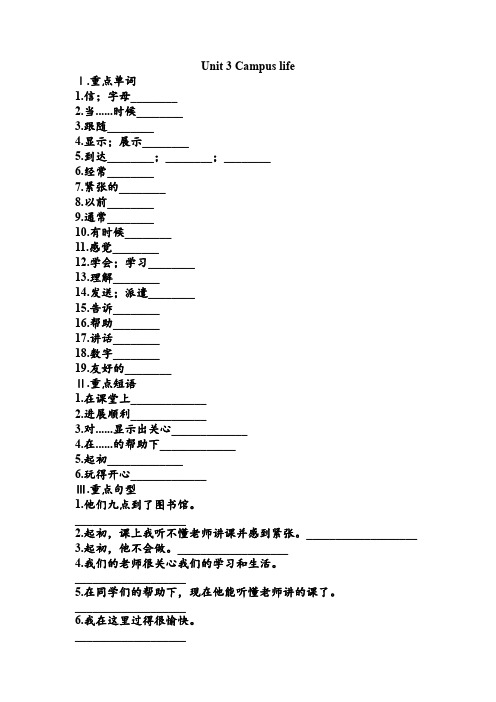
Unit 3 Campus lifeⅠ.重点单词1.信;字母________2.当......时候________3.跟随________4.显示;展示________5.到达________;________;________6.经常________7.紧张的________8.以前________9.通常________10.有时候________11.感觉________12.学会;学习________13.理解________14.发送;派遣________15.告诉________16.帮助________17.讲话________18.数字________19.友好的________Ⅱ.重点短语1.在课堂上_____________2.进展顺利_____________3.对......显示出关心_____________4.在......的帮助下_____________5.起初_____________6.玩得开心_____________Ⅲ.重点句型1.他们九点到了图书馆。
___________________2.起初,课上我听不懂老师讲课并感到紧张。
___________________3.起初,他不会做。
___________________4.我们的老师很关心我们的学习和生活。
___________________5.在同学们的帮助下,现在他能听懂老师讲的课了。
___________________6.我在这里过得很愉快。
___________________7.你一切都好么?___________________参考答案Ⅰ.重点单词1.letter2.when3.follow4.show5.get;arrive;reach6.often7.nervous8.agoually 10.sometimes 11.feel 12.enjoy 13.learn 14.send 15.tell 16.help17.speak18. number 19.friendlyⅡ.重点短语1.in class2.go well3.show concern about...4. with the help of...5.at first6.have a good timeⅢ.重点句型1.They got to the library at nine.2.At first,I couldn’t follow the teachers in class and I felt nervous.3.At first,he couldn’t do it.4.Our teachers show great concern about our study and life.5.He can follow his teachers in class now with the help of his classmates.6.I am having a good time here.7.How are you getting along?。
- 1、下载文档前请自行甄别文档内容的完整性,平台不提供额外的编辑、内容补充、找答案等附加服务。
- 2、"仅部分预览"的文档,不可在线预览部分如存在完整性等问题,可反馈申请退款(可完整预览的文档不适用该条件!)。
- 3、如文档侵犯您的权益,请联系客服反馈,我们会尽快为您处理(人工客服工作时间:9:00-18:30)。
想念你 电话号码
我的邮箱地址
Miss you Telephone number My e-mail address
发送邮件或短信
Send e-mail or text messages
致以良好的祝愿 With best wishes
谢谢
中职英语基础模块unit3Campus-life
Knowledge is power. ---Francis Bacon
[ˈnɔlidʒ]
[ˈpauə]
知识就是力量。--弗朗西斯·培根
汉译英,并根据英文分段复数课文。
Paragraph 1、
在…的问候 Greetings from… 感谢你… Thank you… 我很高兴…我 I’m glad to…that I’m 现在是… now…
understand Chinese
对…友好善良 对…关心
在…的帮助下
Be kind and Show concern about With the help of friendly
进展顺利 Go well
汉译英,并根据英文复数课文Paragraph 3:
在上午
在下午
In the morning In the afternoon 从周一至周五 From Monday to Friday
我正在这里…I am here...
汉译英,并根据英文复数课文 Paragraph 2:
一个月以前 来到 到达 A month ago Come to get to
对…是陌生的
Be strange to
说和理解汉语 起初 在课堂上 感到紧张
eak and
At first In class Feel nervous
上课
去实训中心
Have lessons Go to the skill training centre
练习烹饪技能 Practice cooking skills
汉译英,并根据英文复数课文Paragraph 4:
课后
有趣的活动 在周末
After class Interesting activities On weeekends
汉语言
去观光 Go signtseeing
Chinese language
这座伟大而美丽的城市
The great and beautiful city
过得很愉快
Have a good time
你过得怎样? How are you getting along?
汉译英,并根据英文复数课文Paragraph 3:
